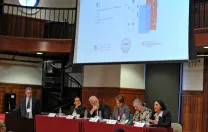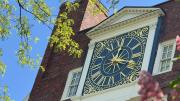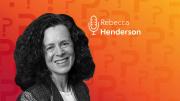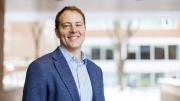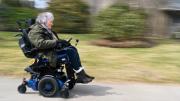"Reimagining the City-University Connection," a symposium held October 21 at the Radcliffe Institute for Advanced Study, suggested ways academia can help the public sector make innovative use of data. For instance:
- Jeremy Levine and Carl Gershenson, graduate students in the Harvard sociology department, combined demographic data with data on Boston residents’ snow removal requests as a measure of civic engagement in the vein of Earls’s collective efficacy. They found that, predictably, neighborhoods with a higher percentage of homeowners (as opposed to renters) demanded more services from the city. Rates of service requests were low in neighborhoods with high concentrations of first-generation immigrants, college students, and residents receiving public assistance. They were surprised to find a strong correlation between the number of service requests and a high percentage of African-American residents, and theorized that these residents may have a lower level of trust in city government and therefore make the same service request multiple times.
- Daniel O’Brien, project manager for the Radcliffe Institute’s Harvard-Boston Research Initiative, used the extensive dataset generated by Boston’s Constituent Relationship Management system, which logs all resident requests for public services, to examine the size of the geographic area for which the average resident takes responsibility, and found it to be quite small (the few blocks immediately surrounding one’s home).
- Jessica Simes, another sociology doctoral student, and Benjamin Lewis, senior GIS specialist at Harvard’s Center for Geographic Analysis, collected data from the Boston Redevelopment Authority and mapped it onto the Boston Research Map, part of the open-source WorldMap system that allows users to publish their own maps and add to others’, integrating multiple data types and sources for the same geographic area.
- Francisca Rojas, a postdoctoral fellow at the HKS Ash Center for Democratic Governance and Innovation, and MIT doctoral student Candace Brakewood analyzed the effect of the MBTA’s decision to release data showing the real-time locations and predicted arrival time of buses and trains. Rojas and Brakewood conducted a rider survey and found that three-quarters of respondents rated on-time arrival rates on routes they traveled as average or worse, and were dissatisfied with the MBTA’s communications about service delays. The researchers shared their findings with the MBTA and will conduct another analysis in 2012.
- A panel featuring new applications of technology included David Lazer, director of the HKS Program on Networked Governmance; Alex “Sandy” Pentland, who directs the MIT Media Lab Entrepreneurship Program; Jennifer Chayes, managing director for Microsoft Research New England; and Nigel Jacob, cochair of the Boston Mayor’s Office of New Urban Mechanics. With the sheer quantity of data available (such as records of where in a city tens of thousands of cell phones have traveled on a given day), the challenge is figuring out what to do with those data, said Lazer. Protecting that data against theft, misuse, and breach of confidentiality is equally important, Chayes cautioned. If privacy protections fail, “we will have a data Tuskegee, and we really don’t want that,” she said, referring to the notorious mid-20th-century medical research study in which hundreds of African-American men in rural Alabama were diagnosed with syphilis, but neither told nor treated, as the researchers studied the disease’s course if left untreated.
